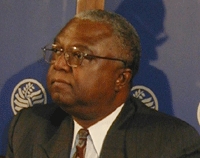
Dr. Amos Sawyer calls
for the Postponement of the 2005 National Elections in Liberia
By Winsley S. Nanka
Wnanka@theperspective.org
The Perspective
Atlanta, Georgia
August 26, 2004
 |
|
Dr. Amos C. Sawyer
|
Dr. Sawyer’s suggestion supports the basic argument of Mr. Weh-Dorliae’s book that the fundamental problem Liberia faces today is due to structural inadequacy in its governing system, which could be addressed only by decentralized governance. According to Mr. Weh-Dorliae, without making the necessary constitutional changes, it would be difficult to achieve good governance in Liberia because the present constitutional order favors a powerful presidency that dominates nearly all aspects of Liberian life. In view of this, Mr. Weh-Dorliae proposes the postponement of the 2005 national elections in Liberia for about a year or so to allow for the necessary constitutional reforms, conduct a national census, and put into motion the “roadmap” for decentralization before elections are held.
Dr. Sawyer was however, quick to note that in order for the mandate of the interim government of Liberia to be extended, two things have to happen: (a) Liberians both at home and the Diaspora should organize a national conference to determine the changes necessary for good governance to be sustainable, and (b) the product of the national conference should be integrated into a “agenda for transition in Liberia”. Dr. Sawyer explained that a national conference would give legitimacy to the decisions reached. Dr. Sawyer further explained that a national conference would make a diagnostic assessment of decentralization and derive a “framework for good governance”.
Cllr. Phillip Banks was, however, swift to note that before the mandate of the interim government is extended, Liberians have to make sure that the present government has the willingness to initiate the changes necessary for good governance to succeed. Cllr. Banks intimated that the 1984 draft constitution of Liberia, which he helped author was intended to resolve some of the issues raised in Mr. Weh-Dorliae’s book. However, the Constitutional Advisory Assembly headed by the late Dr. Edward B. Kesselley assembled in Gbarnga, Bong County, to review the draft constitution inserted provisions beyond the imagination of the Constitution Commission. Speaking further, Cllr. Banks observed that decentralization has limitations for smaller countries. He explained that some of the problems of decentralization are issues of resource allocation. He said that the transitional government could be the best vehicle for structural constitutional changes in Liberia because an elected government may not want to decentralize for fear that it may erode its power.
For their parts, Mr. Bai Gbala and Dr. Al-Hassan Conteh intimated during the panel discussion that they support decentralization in Liberia. Mr. Gbala berated Liberian intellectuals for their failure to analyze the problems in Liberia in a more complex manner that may help find a lasting solution. Dr. Conteh gave a theoretical overview of decentralization and said that given the size of Liberia, Liberians need to carefully evaluate decentralization because of “the trade-off between equity and efficiency”.
Earlier, the moderator of the panel discussion Cllr. Taiwan Gongloe indicated that Dr. Sawyer, Cllr. Banks, Dr. Conteh and Mr. Gbala were uniquely positioned to discuss the issue of good governance because all four men participated in one form or another in governance in Liberia and in doing so, may have contributed to some of the problems in Liberia today.
The issue of postponing the 2005 national elections in Liberia is likely to meet stiff resistance from some Liberian politicians who believe further delay may ruin their chances to ascend to power. Also, it remains to be seen if the international community has the willingness to bankroll and maintain security in Liberia for at least another year. Whatever happens, Mr. Weh-Dorliae’s publication is likely to spark heated debate among Liberia’s political class and the various stakeholders.
The program was attended by a cross section of Liberians including Dr. Margaret Thor Thompson, presidential aspirant of the prospective Freedom Alliance Party of Liberia, Dr. Jabarue Carlon, former vice presidential candidate, Unity Party, Dr. Edward Wonkeyor, an Associate Professor of communications, Temple University, Publisher, Ms. Carolyn Williams, community leader Mr. Vorfee Jabateh, and Mr. Peter Davis who served as the master of ceremony, among others.

